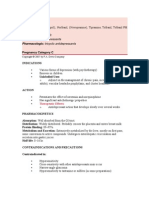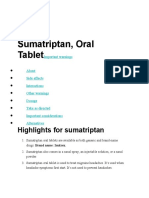Sibutramine - Weight Loss & Weight Management Information
Uploaded by
Evelyn MadridSibutramine - Weight Loss & Weight Management Information
Uploaded by
Evelyn MadridSIBUTRAMINE WEIGHT LOSS & WEIGHT MANAGEMENT INFORMATION
What is Sibutramine? Sibutramine was withdrawn from the U.S. market in October 2010. Sibutramine affects chemicals in the brain that affect weight maintenance. Sibutramine is used together with diet and exercise to treat obesity that may be related to diabetes, high cholesterol, or high blood pressure. Sibutramine may also be used for other purposes not listed in this medication guide.
In This Section:
What is the most important information I should know about Sibutramine? What should I discuss with my healthcare provider before taking Sibutramine? How much does Sibutramine cost? What conditions might Sibutramine treat? What does Sibutramine look like?
What is the most important information I should know about Sibutramine? Sibutramine was withdrawn from the U.S. market in October 2010. Do not use sibutramine if you have taken an MAO inhibitor such as furazolidone (Furoxone), isocarboxazid (Marplan), phenelzine (Nardil), rasagiline (Azilect), selegiline (Eldepryl, Emsam), or tranylcypromine (Parnate) in the last 14 days. Serious, life threatening side effects can occur if you use sibutramine before the MAO inhibitor has cleared from your body. You should not take sibutramine if you are allergic to it, or if you have severe or uncontrolled high blood pressure, an eating disorder (anorexia or bulimia), if you are taking stimulant diet pills, or if you have a history of coronary artery disease, stroke, or heart disease.
Before taking sibutramine, tell your doctor if you have glaucoma, high blood pressure, liver or kidney disease, depression, underactive thyroid, seizures, a bleeding disorder, a history of gallstones, or if you are older than 65 or younger than 16. Tell your doctor about all prescription and over-the-counter medications you use, especially antidepressants, cold or allergy medication, narcotic pain medicine, or migraine headache medicines. Tell your doctor if you do not lose at least 4 pounds after taking the medication for 4 weeks along with a low calorie diet.
What should I discuss with my healthcare provider before taking Sibutramine? Do not use sibutramine if you have taken an MAO inhibitor such as furazolidone (Furoxone), isocarboxazid (Marplan), phenelzine (Nardil), rasagiline (Azilect), selegiline (Eldepryl, Emsam), or tranylcypromine (Parnate) in the last 14 days. Serious, life threatening side effects can occur if you use sibutramine before the MAO inhibitor has cleared from your body. You should not take this medication if you are allergic to sibutramine, or if you have:
severe or uncontrolled hypertension (high blood pressure) an eating disorder (anorexia or bulimia) a history of coronary artery disease (atherosclerosis) a history of heart disease (congestive heart failure, heart rhythm disorder) a history of heart attack or stroke; or if you are taking stimulant diet pills If you have any of these other conditions, you may need a sibutramine dose adjustment or special tests:
glaucoma high blood pressure liver disease kidney disease depression
underactive thyroid epilepsy or seizure disorder a bleeding or blood clotting disorder a history of gallstones; or if you are older than 65 or younger than 16
FDA pregnancy category C. It is not known whether sibutramine will harm an unborn baby. Tell your doctor if you are pregnant or plan to become pregnant while using sibutramine. It is not known whether sibutramine passes into breast milk or if it could harm a nursing baby. Do not use this medication without telling your doctor if you are breast-feeding a baby. Do not give this medication to anyone younger than 16 years old.
GENERIC NAME: sibutramine BRAND NAME: Meridia NOTE: On October 8, 2010, Meridia (sibutramine) was withdrawn from the market due to the risk of serious cardiovascular events. DRUG CLASS AND MECHANISM: Sibutramine is a medication that assists with weight-loss by altering neurotransmitters within the brain. Neurotransmitters are chemicals that are produced and released by nerves in order to communicate with other nerves. Released neurotransmitters may attach to other nerves or they may be taken up again by the nerves that release them, a process termed reuptake. Sibutramine blocks the reuptake of the neurotransmitters dopamine, norepinephrine, and serotonin. Blocking the reuptake of neurotransmitters alters the balance of neurotransmitters within the nerve cells and thereby affect nerve function and interaction.
Patients taking sibutramine may achieve a 5-10% reduction from their baseline weight. Additionally, sibutramine-assisted weight loss has been accompanied by improvement in blood lipids (e.g, cholesterol). Sibutramine was approved by the FDA in 1997.
GENERIC AVAILABLE: No
PRESCRIPTION: Yes
PREPARATIONS: Capsules: 5mg (blue and yellow); 10mg (blue and white); 15mg (white and yellow)
STORAGE: Capsules should be stored at 25C (77F). Brief periods at higher or lower temperatures, i.e., 15-30C (59-86F) are permitted. The medication should be stored in a tight, light-resistant container. The capsules should be protected from heat and moisture.
PRESCRIBED FOR: Sibutramine is used for weight loss in conjunction with a low calorie diet. Specific populations for whom the medication is recommended are those with an initial body mass index of more than 30 kg/m2 (27 mg/m2 if they also have other risk factors such as diabetes mellitus, high cholesterol or hypertension).
DOSING: Sibutramine is taken once daily, generally in the morning. Therapy usually is started with one 10mg tablet per day. The dose may be increased to 15mg by the physician after several weeks to achieve the desired effect. Doses of up to 60mg have been studied. Sibutramine may be taken with or without food.
DRUG INTERACTIONS: Sibutramine must be converted in the liver to its active form. This conversion is inhibited by ketoconazole (Nizoral), cimetidine (Tagamet) and erythromycin (Erytab, Eryc, Ilosone), and use of these drugs can result in decreased conversion and effectiveness of sibutramine. Several other drugs may have a similar effect. These other drugs include clarithromycin (Biaxin), danazol (Danocrine), diltiazem (Cardizem, Tiazac, Dilacor), fluconazole (Diflucan), fluoxetine (Prozac), itraconazole (Sporanox), propoxyphene (Darvon), troleandomycin (Tao) and verapamil (Verelan, Covera, Calan, Isoptin).
You might also like
- Cambridge Academic English Upper Intermediate Teacher's Book90% (40)Cambridge Academic English Upper Intermediate Teacher's Book161 pages
- A Joosr Guide to... The Sirtfood Diet by Aidan Goggins and Glen Matten: The Revolutionary Plan for Health and Weight LossFrom EverandA Joosr Guide to... The Sirtfood Diet by Aidan Goggins and Glen Matten: The Revolutionary Plan for Health and Weight LossNo ratings yet
- High Triglycerides Diet: A Beginner's 3-Week Step-by-Step Guide With Curated Recipes and a 7-Day Meal PlanFrom EverandHigh Triglycerides Diet: A Beginner's 3-Week Step-by-Step Guide With Curated Recipes and a 7-Day Meal PlanNo ratings yet
- Medical Encyclopedia XXL: Prof. J.P. Schadé, M.D., Ph.D. D.Sc.hcFrom EverandMedical Encyclopedia XXL: Prof. J.P. Schadé, M.D., Ph.D. D.Sc.hcNo ratings yet
- Desloratadine Oral Uses, Side Effects, InteractiNo ratings yetDesloratadine Oral Uses, Side Effects, Interacti1 page
- Amitriptyline: What Is This Medication For?No ratings yetAmitriptyline: What Is This Medication For?5 pages
- "What Are The Possible Side Effects of Qsymia?": Reference ID: 3634966No ratings yet"What Are The Possible Side Effects of Qsymia?": Reference ID: 36349667 pages
- Targeted Weight Reduction Using Sibutramine.No ratings yetTargeted Weight Reduction Using Sibutramine.4 pages
- Drug Study (Acamprosate (Campral) and Bupropion)No ratings yetDrug Study (Acamprosate (Campral) and Bupropion)5 pages
- Chlorpheniramine Oral Uses, Side Effects, InteraNo ratings yetChlorpheniramine Oral Uses, Side Effects, Intera1 page
- Diabete: Weight Loss and Exercise: The most important information you need to improve your healthFrom EverandDiabete: Weight Loss and Exercise: The most important information you need to improve your health5/5 (1)
- Top 100 Drugs Pocket Reference Guide (2023 Edition)From EverandTop 100 Drugs Pocket Reference Guide (2023 Edition)No ratings yet
- Bupropion - Patient Drug Information - UpToDateNo ratings yetBupropion - Patient Drug Information - UpToDate7 pages
- Child: PO/IV 0.05 MG/KG q4-8h (Max: 2 Mg/dose)No ratings yetChild: PO/IV 0.05 MG/KG q4-8h (Max: 2 Mg/dose)2 pages
- Cipralex Uses, Dosages, Side Effects, PrecautionsNo ratings yetCipralex Uses, Dosages, Side Effects, Precautions1 page
- Wellbutrin SR: (Bupropion Hydrochloride) Sustained-Release TabletsNo ratings yetWellbutrin SR: (Bupropion Hydrochloride) Sustained-Release Tablets35 pages
- Adrenal Fatigue Diet: A Beginner's Step-by-Step Guide to Reversing Adrenal Fatigue Symptoms Through Diet: With Recipes and a Meal PlanFrom EverandAdrenal Fatigue Diet: A Beginner's Step-by-Step Guide to Reversing Adrenal Fatigue Symptoms Through Diet: With Recipes and a Meal PlanNo ratings yet
- Adrenal Fatigue Diet: A Beginner’s Step-by-Step Guide to Reversing Adrenal Fatigue Symptoms Through Diet: With Recipes and a Meal PlanFrom EverandAdrenal Fatigue Diet: A Beginner’s Step-by-Step Guide to Reversing Adrenal Fatigue Symptoms Through Diet: With Recipes and a Meal PlanNo ratings yet
- Sirtfood Diet Cookbook: Quick and Healthy Recipes to Lose Weight. Start to Burn Fat Boosting Your Metabolism and Activating Your “Skinny Gene”.From EverandSirtfood Diet Cookbook: Quick and Healthy Recipes to Lose Weight. Start to Burn Fat Boosting Your Metabolism and Activating Your “Skinny Gene”.No ratings yet
- Team Pe-Pink Audit Objective Relevant Data Documents NeededNo ratings yetTeam Pe-Pink Audit Objective Relevant Data Documents Needed1 page
- Project Title: Researchers: Name: Address: Contact #: Email: Background StudyNo ratings yetProject Title: Researchers: Name: Address: Contact #: Email: Background Study1 page
- Project Updat Es Requesti NG Party Date Funding Amou NT StatusNo ratings yetProject Updat Es Requesti NG Party Date Funding Amou NT Status2 pages
- Provide Content For Browsers Without Frame Support: To The TopNo ratings yetProvide Content For Browsers Without Frame Support: To The Top2 pages
- Power Consumption Monitoring System: Title of The StudyNo ratings yetPower Consumption Monitoring System: Title of The Study2 pages
- How To Insert Frame: Insert, HTML, and FramesNo ratings yetHow To Insert Frame: Insert, HTML, and Frames4 pages
- View and Set Frameset Properties: Change The Background Color of A Document in A FrameNo ratings yetView and Set Frameset Properties: Change The Background Color of A Document in A Frame2 pages
- Frames in Dreamweaver 8: Insert, HTML, and FramesNo ratings yetFrames in Dreamweaver 8: Insert, HTML, and Frames5 pages
- Pagdaraoan: Tourist Spots in Pagdaraoan San Fernando La UnionNo ratings yetPagdaraoan: Tourist Spots in Pagdaraoan San Fernando La Union3 pages
- Cambridge Academic English Upper Intermediate Teacher's BookCambridge Academic English Upper Intermediate Teacher's Book
- A Joosr Guide to... The Sirtfood Diet by Aidan Goggins and Glen Matten: The Revolutionary Plan for Health and Weight LossFrom EverandA Joosr Guide to... The Sirtfood Diet by Aidan Goggins and Glen Matten: The Revolutionary Plan for Health and Weight Loss
- High Triglycerides Diet: A Beginner's 3-Week Step-by-Step Guide With Curated Recipes and a 7-Day Meal PlanFrom EverandHigh Triglycerides Diet: A Beginner's 3-Week Step-by-Step Guide With Curated Recipes and a 7-Day Meal Plan
- Medical Encyclopedia XXL: Prof. J.P. Schadé, M.D., Ph.D. D.Sc.hcFrom EverandMedical Encyclopedia XXL: Prof. J.P. Schadé, M.D., Ph.D. D.Sc.hc
- "What Are The Possible Side Effects of Qsymia?": Reference ID: 3634966"What Are The Possible Side Effects of Qsymia?": Reference ID: 3634966
- Diabete: Weight Loss and Exercise: The most important information you need to improve your healthFrom EverandDiabete: Weight Loss and Exercise: The most important information you need to improve your health
- Top 100 Drugs Pocket Reference Guide (2023 Edition)From EverandTop 100 Drugs Pocket Reference Guide (2023 Edition)
- Wellbutrin SR: (Bupropion Hydrochloride) Sustained-Release TabletsWellbutrin SR: (Bupropion Hydrochloride) Sustained-Release Tablets
- Adrenal Fatigue Diet: A Beginner's Step-by-Step Guide to Reversing Adrenal Fatigue Symptoms Through Diet: With Recipes and a Meal PlanFrom EverandAdrenal Fatigue Diet: A Beginner's Step-by-Step Guide to Reversing Adrenal Fatigue Symptoms Through Diet: With Recipes and a Meal Plan
- Adrenal Fatigue Diet: A Beginner’s Step-by-Step Guide to Reversing Adrenal Fatigue Symptoms Through Diet: With Recipes and a Meal PlanFrom EverandAdrenal Fatigue Diet: A Beginner’s Step-by-Step Guide to Reversing Adrenal Fatigue Symptoms Through Diet: With Recipes and a Meal Plan
- Sirtfood Diet Cookbook: Quick and Healthy Recipes to Lose Weight. Start to Burn Fat Boosting Your Metabolism and Activating Your “Skinny Gene”.From EverandSirtfood Diet Cookbook: Quick and Healthy Recipes to Lose Weight. Start to Burn Fat Boosting Your Metabolism and Activating Your “Skinny Gene”.
- Team Pe-Pink Audit Objective Relevant Data Documents NeededTeam Pe-Pink Audit Objective Relevant Data Documents Needed
- Project Title: Researchers: Name: Address: Contact #: Email: Background StudyProject Title: Researchers: Name: Address: Contact #: Email: Background Study
- Project Updat Es Requesti NG Party Date Funding Amou NT StatusProject Updat Es Requesti NG Party Date Funding Amou NT Status
- Provide Content For Browsers Without Frame Support: To The TopProvide Content For Browsers Without Frame Support: To The Top
- Power Consumption Monitoring System: Title of The StudyPower Consumption Monitoring System: Title of The Study
- View and Set Frameset Properties: Change The Background Color of A Document in A FrameView and Set Frameset Properties: Change The Background Color of A Document in A Frame
- Pagdaraoan: Tourist Spots in Pagdaraoan San Fernando La UnionPagdaraoan: Tourist Spots in Pagdaraoan San Fernando La Union







































































